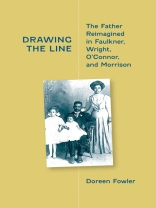In an original contribution to the psychoanalytic approach to literature, Doreen Fowler focuses on the fiction of four major American writers—William Faulkner, Richard Wright, Flannery O’Connor, and Toni Morrison—to examine the father’s function as a ‘border figure.’ Although the father has most commonly been interpreted as the figure who introduces opposition and exclusion to the child, Fowler finds in these literary depictions fathers who instead support the construction of a social identity by mediating between cultural oppositions.
Fowler counters the widely accepted notion that boundaries are solely sites of exclusion and offers a new theoretical model of boundary construction. She argues that boundaries are mysterious, dangerous, in-between places where a balance of sameness and difference makes differentiation possible. In the fiction of these southern writers, father figures introduce a separate cultural identity by modeling this mix of relatedness and difference. Fathers intervene in the mother-child relationship, but the father is also closely related to both mother and child. This model of boundary formation as a balance of exclusion and relatedness suggests a way to join with others in an inclusive, multicultural community and still retain ethnic, racial, and gender differences.
Fowler’s model for the father’s mediating role in initiating gender, race, and other social differences shows not only how psychoanalytic theory can be used to interpret fiction and cultural history but also how literature and history can reshape theory.
A propos de l’auteur
Doreen Fowler, Professor of English at the University of Kansas, is the author of Faulkner: The Return of the Repressed (Virginia) and the coeditor of eleven volumes of the proceedings of the annual Faulkner and Yoknapatawpha Conference in Oxford, Mississippi.












